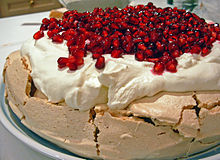Pavlova

Pavlova (sometimes written in German also pawlova ) is a cake filled with cream and fruit made from a meringue mass that is considered a national dish in both Australia and New Zealand . Both countries claim the invention of the dessert for themselves. What is certain is that the cake was named after the Russian ballerina Anna Pavlova , who made guest appearances in both countries in the late 1920s. The Oxford English Dictionary names New Zealand as the place of origin because the oldest known recipe of that name appeared there in 1927.
nature
The special thing about the meringue mass at Pavlova is that only the outer shell becomes hard while the inside remains soft, which is achieved by adding a little vinegar or lemon juice as well as cornstarch when preparing the mass. After baking, the meringue cake is cut open, filled with whipped cream and fruit and decorated. The use of passion fruit is traditional .
Dispute of origin
Who first created the Pavlova has been controversial between Australia and New Zealand for decades. In Australia, the version favored is the version according to which the German-born Herbert Sachse, as head chef of the Hotel Esplanade in Perth, invented this cake in 1935 and named it after Anna Pawlowa with the comment "It [the meringue] is as light as the Pavlova" was inspired by the tutu of the Russian ballet dancer. There is evidence that the name Pavlova was used in New Zealand as early as 1927, but initially for a different dessert. After extensive research, the New Zealand anthropologist Helen Leach found several pieces of evidence that the cake was already known in New Zealand before 1935. A New Zealand cookbook from 1929 contains a recipe for Pavlova Cakes , which are largely the same as the well-known Pavlova , with the difference that they were several small tarts. Similar recipes appeared in the following years, so it can be assumed that Sachse is not the inventor.
Individual evidence
- ^ A b c Alan Davidson : The Oxford Companion to Food. Oxford University Press, Oxford et al. 1999, ISBN 0-19-211579-0 , p. 584: Article Pavlova .
- ↑ Pavlova on Chefkoch.de
- ↑ Glen Ralph: Whipping is Pavlovian
- ^ The Telegraf: New Zealand wins Pavlova debate
See also
Web links
- Michael Lenz: Reisespeisen: Monument made of egg whites and cream Article about the Pavlova on Spiegel Online